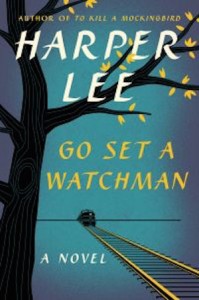The Harpers Lee and Collins have certainly presented readers with a lively spectacle these past six months with the promise of another novel by the famous first-novelist-forever Lee.
 The Harpers Lee and Collins have certainly presented readers with a lively spectacle these past six months with the promise of another novel by the famous first-novelist-forever Lee. Go Set a Watchman was written and submitted to Lippincott before To Kill a Mockingbird (published in 1960). Opinion seems to be divided as to whether Watchman should be considered as a first draft of Mockingbird, a separate book entirely, or even a sequel, since it involves many of the Mockingbird characters some twenty years on.
The Harpers Lee and Collins have certainly presented readers with a lively spectacle these past six months with the promise of another novel by the famous first-novelist-forever Lee. Go Set a Watchman was written and submitted to Lippincott before To Kill a Mockingbird (published in 1960). Opinion seems to be divided as to whether Watchman should be considered as a first draft of Mockingbird, a separate book entirely, or even a sequel, since it involves many of the Mockingbird characters some twenty years on.Got me, but I can see why Lee's editor encouraged her to put Watchman aside for Mockingbird. Almost all of the most dynamic scenes in Go Set a Watchman are flashbacks to or recollections of its heroine's youth; in fact, it mostly feels like a manuscript that the writer failed to set sufficiently back in time in order to accomodate the story she wanted to tell. You can see an editor tapping her finger on any one of the scenes about the young Scout Finch and saying, "start here." In contrast to such recollected moments as the barely pubescent Scout thinking she's gotten pregnant from a French kiss, the scenes that take place in the novel's present are mostly static and talky. Lord are they talky. (One great exception is a chilling episode where grown-Scout encounters her former housekeeper Calpurnia, who barely says a word.)
The big drama upon the book's release this week was the alleged revelation that America's most (only?) beloved lawyer Atticus Finch had turned into a big ol' racist. I dunno: while Michiko Kakutani tries to whip up some breathless outrage about this in her NYT review; as Barbara Hoffert writes in her Library Journal review, it's completely possible to see the seeds of Watchman's Atticus in Mockingbird's. And the grown Scout's horror at her father's true colors is distinctly undercut by the fact that she agrees with him more than she will admit, with the novel as a whole ending more on Atticus's side than not and a weak-sauce conclusion that white people shore can be complicated.
I kind of respect HarperCollins' apparent decision to present this novel sans apology or contextualizing; there's no fancy introduction by some respected literary figure making the book Okay. But the novel cries out for annotation, both for its connections to (and contradictions of) To Kill a Mockingbird and for its assumption of an early 1960s audience, who would be expected to understand allusions to then-recent events (such as Brown v. Board of Education) that aren't spelled out in the book. As a literary curiosity it is completely fascinating; as a book on its own, not so much. But I am loving the fact the the drama that has attended the publication of (and the fact of that publication itself) Go Set a Watchman is only possible because so many people fell hard in love with To Kill a Mockingbird as children. Those are the books you really hold onto.
RELATED
RECOMMENDED
ALREADY A SUBSCRIBER? LOG IN
We are currently offering this content for free. Sign up now to activate your personal profile, where you can save articles for future viewing.








Add Comment :-
Comment Policy:
Comment should not be empty !!!
Jennifer Schultz
"But the novel cries out for annotation..." Agreed. I think a publication similar to Pioneer Girl would have been a better decision in the long run.Posted : Jul 20, 2015 06:58
ChristineTB
Nicely articulated.Posted : Jul 17, 2015 01:23
Fran Manushkin
What makes me happy is that this book is helping the bottom line of many independent bookshops. For that, I offer a great huzzah!Posted : Jul 16, 2015 10:43
Lisa Yee
To Kill A Mockingbird shows how much influence a great editor can have on a book.Posted : Jul 16, 2015 08:54